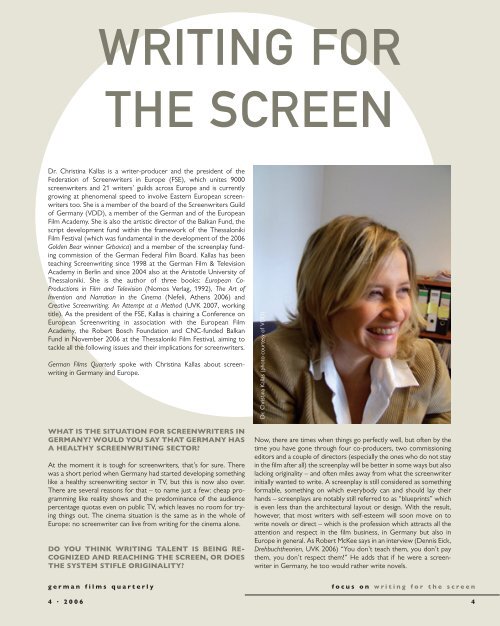Quarterly 4 · 2006 - German Cinema
Quarterly 4 · 2006 - German Cinema
Quarterly 4 · 2006 - German Cinema
You also want an ePaper? Increase the reach of your titles
YUMPU automatically turns print PDFs into web optimized ePapers that Google loves.
WRITING FOR<br />
THE SCREEN<br />
Dr. Christina Kallas is a writer-producer and the president of the<br />
Federation of Screenwriters in Europe (FSE), which unites 9000<br />
screenwriters and 21 writers’ guilds across Europe and is currently<br />
growing at phenomenal speed to involve Eastern European screenwriters<br />
too. She is a member of the board of the Screenwriters Guild<br />
of <strong>German</strong>y (VDD), a member of the <strong>German</strong> and of the European<br />
Film Academy. She is also the artistic director of the Balkan Fund, the<br />
script development fund within the framework of the Thessaloniki<br />
Film Festival (which was fundamental in the development of the <strong>2006</strong><br />
Golden Bear winner Grbavica) and a member of the screenplay funding<br />
commission of the <strong>German</strong> Federal Film Board. Kallas has been<br />
teaching Screenwriting since 1998 at the <strong>German</strong> Film & Television<br />
Academy in Berlin and since 2004 also at the Aristotle University of<br />
Thessaloniki. She is the author of three books: European Co-<br />
Productions in Film and Television (Nomos Verlag, 1992), The Art of<br />
Invention and Narration in the <strong>Cinema</strong> (Nefeli, Athens <strong>2006</strong>) and<br />
Creative Screenwriting. An Attempt at a Method (UVK 2007, working<br />
title). As the president of the FSE, Kallas is chairing a Conference on<br />
European Screenwriting in association with the European Film<br />
Academy, the Robert Bosch Foundation and CNC-funded Balkan<br />
Fund in November <strong>2006</strong> at the Thessaloniki Film Festival, aiming to<br />
tackle all the following issues and their implications for screenwriters.<br />
<strong>German</strong> Films <strong>Quarterly</strong> spoke with Christina Kallas about screenwriting<br />
in <strong>German</strong>y and Europe.<br />
WHAT IS THE SITUATION FOR SCREENWRITERS IN<br />
GERMANY? WOULD YOU SAY THAT GERMANY HAS<br />
A HEALTHY SCREENWRITING SECTOR?<br />
At the moment it is tough for screenwriters, that’s for sure. There<br />
was a short period when <strong>German</strong>y had started developing something<br />
like a healthy screenwriting sector in TV, but this is now also over.<br />
There are several reasons for that – to name just a few: cheap programming<br />
like reality shows and the predominance of the audience<br />
percentage quotas even on public TV, which leaves no room for trying<br />
things out. The cinema situation is the same as in the whole of<br />
Europe: no screenwriter can live from writing for the cinema alone.<br />
DO YOU THINK WRITING TALENT IS BEING RE-<br />
COGNIZED AND REACHING THE SCREEN, OR DOES<br />
THE SYSTEM STIFLE ORIGINALITY?<br />
Dr. Christina Kallas (photo courtesy of VDD)<br />
Now, there are times when things go perfectly well, but often by the<br />
time you have gone through four co-producers, two commissioning<br />
editors and a couple of directors (especially the ones who do not stay<br />
in the film after all) the screenplay will be better in some ways but also<br />
lacking originality – and often miles away from what the screenwriter<br />
initially wanted to write. A screenplay is still considered as something<br />
formable, something on which everybody can and should lay their<br />
hands – screenplays are notably still referred to as “blueprints” which<br />
is even less than the architectural layout or design. With the result,<br />
however, that most writers with self-esteem will soon move on to<br />
write novels or direct – which is the profession which attracts all the<br />
attention and respect in the film business, in <strong>German</strong>y but also in<br />
Europe in general. As Robert McKee says in an interview (Dennis Eick,<br />
Drehbuchtheorien, UVK <strong>2006</strong>) “You don’t teach them, you don’t pay<br />
them, you don’t respect them!” He adds that if he were a screenwriter<br />
in <strong>German</strong>y, he too would rather write novels.<br />
german films quarterly focus on writing for the screen<br />
4 <strong>·</strong> <strong>2006</strong> 4
















